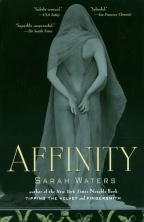Affinity
Sarah Waters
Riverhead Books
US Hardback
ISBN: 1573228737
351 Pages; $14.00
Date Reviewed: 4th June 2003
Reviewed by: Serena Trowbridge © 2003

REFERENCES
COLUMNS
|
|
|
AffinitySarah WatersRiverhead BooksUS HardbackISBN: 1573228737351 Pages; $14.00Date Reviewed: 4th June 2003Reviewed by: Serena Trowbridge © 2003 |
|
|
REFERENCES |
COLUMNS |
Affinity is the third Gothic offering from rising literary star Sarah Waters. Like her previous novels, Tipping the Velvet and Fingersmith, Affinity is set in Victorian London, which she evokes with a sure touch and decorates with delightfully Dickensian characters. Set in Millbank women's prison, this is the story of Selina Dawes, a spiritualist and medium imprisoned for assault and fraud during the course of her work, and Margaret Prior, a respectable Victorian lady mourning the death of her beloved father and the end of a relationship. Margaret begins to visit the prison as a way to forget the past, and whilst mixing with a fascinating variety of criminals from all walks of life, she finds herself irresistibly drawn to Selina.
Waters earned a certain amount of notoriety after Tipping the Velvet, particularly after it was televised in Britain, but this novel is less of a romp and more of a somber parade of unhappy lives searching for happiness. After reading it, the gray corridors of Millbank stayed in my mind for longer than the raucous stage of Tipping the Velvet. The "love that dare not speak its name" truly remains unspoken in Affinity, although we know it's there, but the delicate, precious emotions of the characters do not need explicit scenes.
The plot weaves a spell around the reader, until, however skeptical you may be about the claims the medium makes, you want to believe it. Although the narrative is framed in two diaries, one of the events leading to Selina's imprisonment and the other detailing Margaret's life, the reader remains in the dark as to the true course of events until the last minute, and it makes unputdownable reading. Waters creates an atmosphere that is spooky, creepy and utterly thrilling. Her grasp of language is flawless, which serves to make her novels convincing as Victorian genre fiction. She writes about love, love lost and found, death and loss, despair and happiness, with a precision and gut-wrenching realism which allows the reader to share in every moment of the characters' lives.
The novel has a particular value beyond the emotional, however, and that is Waters' preoccupation with the rise of feminism in Victorian Britain, and she states her case for this clearly without ever preaching or appearing to moralise. The prison walls which hold the captive women are, it seems, no more a prison than their gender and the walls that created the myth of the angel in the house. Margaret is, technically, free, but she chafes against her role in life and is imprisoned by her femininity and, eventually, by her love. The claustrophobic atmosphere of the novel extends beyond the prison walls, and for a while it seems that faith and love can set the women free, but the lasting idea of this novel is that only the truth can set you free - which is a cliché, but one that too many novelists ignore. Essentially, it's a novel that makes you care about the characters, and certainly kept me thinking long after I finished reading it.